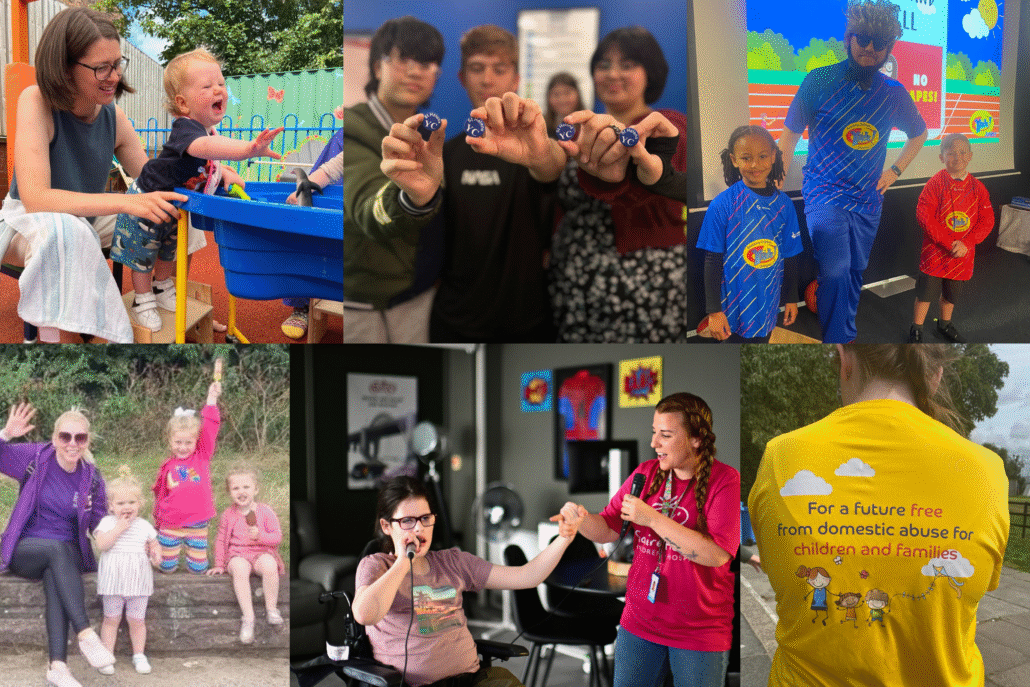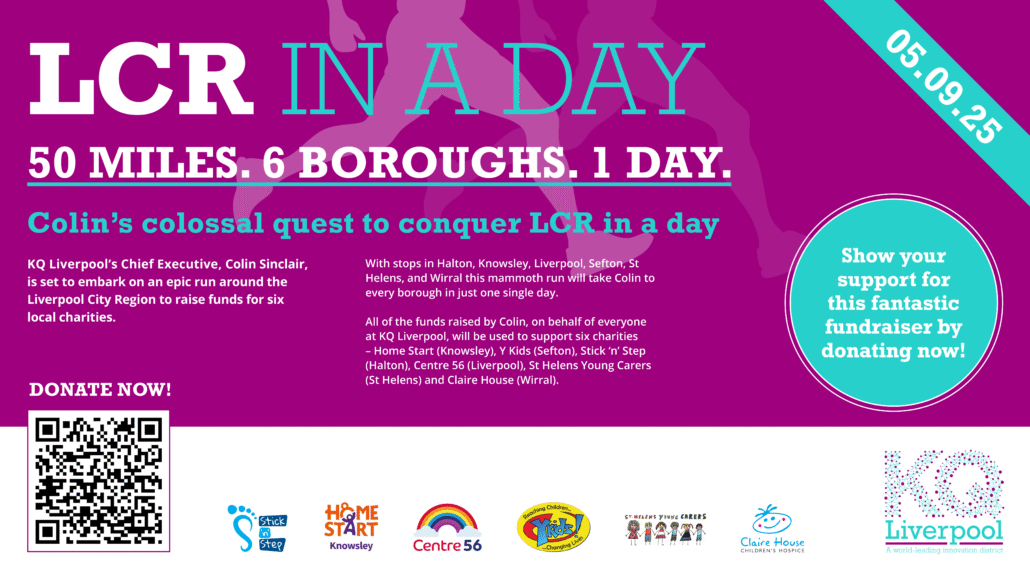KQ Liverpool skills programme reaches hundreds of LCR students
Knowledge Quarter Liverpool’s KQ Futures Programme has engaged with more than 500 children and young people in its first full year of activity.
Knowledge Quarter Liverpool’s KQ Futures Programme has engaged with more than 500 children and young people in its first full year of activity.
The Infection Innovation Consortium: iiCON and partners have launched the first human challenge trial for a new vaccine for pneumococcal disease – marking a key milestone in a collaborative global project that is offering new hope in the fight against the disease.
Liverpool is in the running to be crowned European Capital of Innovation 2026 after reaching the semi-final stage of the prestigious competition.
River of Light – the much-loved, free light festival which every year transforms Liverpool’s iconic waterfront into an outdoor art gallery – has announced its 2025 line-up with a brand new theme.
Colin Sinclair, chief executive of Knowledge Quarter Liverpool and Sciontec, has completed the incredible feat of running 52 miles across the Liverpool City Region in a single day.
Colin Sinclair, chief executive of Knowledge Quarter Liverpool and Sciontec, is today embarking on an epic double-marathon attempt to run across the Liverpool City Region in a day to raise money for local charities.
Catapults play a critical role in the UK’s innovation ecosystem and its prospects for further economic growth. Established and supported by Innovate UK, Catapults help innovation organisations to turn their bright ideas into reality by providing them with a commercial interface between academia and the private sector.
At Knowledge Quarter Liverpool (KQ Liverpool), we are fortunate to have seen first-hand the positive impact they can have across our innovation district and the wider city region.
The UK has nine Catapults with a national presence spanning over 65 locations. Their specialisms range from Medicines Discovery to Compound Semiconductors and Offshore Renewables, each with a particular focus on late-stage R&D, helping innovative businesses get their high potential ideas to market.
The Manufacturing Technology Centre (MTC), part of the High Value Manufacturing (HVM) Catapult, calls Liverpool Science Park its home in the north west. Since 2010 it has established a proven record in helping to deliver innovation in manufacturing and technology solutions through collaboration with purpose, helping to transform industries and change lives for the better.
As a leading research and technology organisation at the forefront of manufacturing innovation, MTC transforms how products are designed, made and built so that they can be produced on a commercial scale – more sustainably, effectively and safely.
Charlie Whitford, Director of North West Region at MTC says:
“As the MTC celebrates our 10th year in Liverpool we continue to grow our support for industry in the region and draw on regional capabilities to support industry across the UK. In particular, the MTC in LCR hosts the Digital Manufacturing Accelerator, the UK’s leading hub for the commercial acceleration of digital manufacturing technologies supported by the Liverpool City Region Combined Authority.”
CPI, which also has an office at Sciontec-owned Liverpool Science Park, is part of HVM Catapult. This gives CPI direct involvement in UK and EU science and innovation strategy alongside sustained investment to ensure staff and facilities are at the cutting-edge of product and process development.
For pioneering businesses, this means they have a deep tech innovation partner that can help them to scale-up their ideas across sectors such as energy, medical tech, pharma or materials. A fantastic asset for our innovation district.
Connected Places Catapult, the UK’s innovation accelerator for transport, the built environment, cities and local growth, is another member of the Catapult Network, with a home in KQ Liverpool, this time at Sciontec AI in The Spine.
Connected Places Catapult is working actively in Liverpool with a key focus on sustainability in the maritime sector, having published a study on the Liverpool to Belfast green shipping corridor. As part of this, the team has been looking at ‘ports as energy hubs’ with a focus on Liverpool and the Stanlow refinery. The team is also examining the opportunity for coastal shipping to take traffic off the roads in Liverpool with Bibby Marine, Peel Ports and other regional partners.
We were proud to work directly with CPC on our illustrated children’s book, The Animates: Learning in Liverpool. Written by local author Natalie Reeves-Billing, it was specially commissioned by KQ Liverpool, in partnership with Connected Places Catapult, and is part of a major focus on inspiring and training the next generation of innovators, by helping young people to understand the many innovative careers that exist in their home city.
It follows the adventures of six animal inventors who crash-land in KQ Liverpool and must search for the innovations needed to repair their ship. With support from CPC and other partners, we then delivered more than 5,000 copies, reaching every Liverpool City Region primary school, thanks to Innovation Zone funding from the Liverpool City Region Combined Authority.
The Catapults in our innovation district also offer hubs, laboratories, testbeds, factories, and offices, each powered by experts who bring innovators together to prove and adopt breakthrough high-quality products, services, and technologies.
Kris Wadrop, Managing Director – Materials, at CPI says:
“Facilitated work space alongside universities, as that offered by Sciontec in the Knowledge Quarter, is essential within the Academic-Catapult-Industry ecosystem to allow people to collaborate, see each other on a daily basis, build trust and create lasting working relationships.
“Enabling the Catapults to share space with the academic institutions allows unparalleled access to transfer knowledge and build partnerships. The facilities within KQ Liverpool also allow a cost-effective regional presence to be established, enabling HVM Catapult to support the innovation ambitions of the Liverpool City Region Combined Authority, ensuring the capabilities and priorities within the region are exemplified and delivered. ”
Recent data shared by Innovate UK shows 80% of businesses that have worked with at least one Catapult say that their innovative projects would not have happened, or not have happened at the same speed, without Catapult involvement. The same number said that Catapults helped to improve the quality of their products and services.
Meanwhile, according to 90% of the businesses surveyed, Catapults also play a significant role in helping innovative businesses form partnerships, crucial for the success of innovative projects, enabling the pooling of expertise, resources, shared risks, market access, and accelerated development.
In turn, this means businesses working with Catapults are more likely to get a product or project to market, with the same findings showing that turnover of small and micro businesses working with Catapults rose by 27% when compared with other similar businesses, rising to a huge 50% increase after six years.
There can be little doubt that the multiplier effect of Catapults can have a significant medium-to-long-term impact on businesses prepared to invest in R&D, supported by a unique combination of facilities and expertise.
If the Liverpool City Region is to further secure its place as a global destination for innovation, international businesses need to see the UK innovation landscape as the perfect place to push their innovations forward. Catapults will continue to play an incredibly important role in those ambitions.
KQ Liverpool has selected six charities, one from each borough, all of whom share its commitment to supporting young people in the Liverpool City Region. You can read more about each of them below:
Established in 1999, Home-Start Knowsley is an independent, early-intervention charity that supports local families with at least one child under the age of eleven. It offers peer-led early help in the home to prevent crisis, build family resilience and ensure that every parent has the support they need so their children have the best start in life, including a safe, nurturing and stimulating environment to thrive in, reducing the risk of Adverse Childhood Experiences.
Ykids works to improve the lives and futures of children, young people and their families living in some of the UK’s most deprived areas. While its heart and soul are in its local community of Bootle, it actively works across the Liverpool City Region; providing innovative mentoring programmes, school and literacy projects, sports and arts initiatives, large community events, parent groups and support, a community pantry and ten weekly clubs ranging from theatre and the arts, to life skills and sport.
Stick ‘n’ Step is a charity that enables, inspires and supports children with cerebral palsy and their families. It supports children and young people with cerebral palsy up to the age of 25 through the provision of free weekly conductive education sessions, delivered by highly skilled professionals from specialist centres in Runcorn and Wallasey and designed to help each child reach their personal potential in terms of mobility, confidence, and independence.
Centre 56 is a domestic abuse charity in the heart of North Liverpool which puts children first. The organisation provides childcare, information and support for families and children who have suffered, or are at risk of domestic abuse or a crisis situation. Its mission is to create a world where every family member feels safe and secure and where families have food on the table in warm homes, without the fear of violence.
A Young Carer is someone aged 6 to 18 who provides regular or ongoing care and emotional support towards a family member who is ill, disabled, has a mental health condition or misuses drugs or alcohol. They often take on practical and/or emotional caring responsibilities that would normally be expected of an adult. This charity believes every Young Carer should have the same opportunities as other children and young people of a similar age.
Claire House Children’s Hospice
Claire House Children’s Hospice in Bebington helps seriously and terminally ill children live life to the full by creating wonderful experiences and bringing back a sense of normality to family life. By providing specialist nursing and end of life care, as well as emotional support, its team of trained, passionate professionals helps families through some of the toughest times of their lives.
We are proud to be able to support these six incredible charities. If you would like to make a donation, please visit: www.givewheel.com/fundraising/8844/lcr-in-a-day.


We are thrilled to announce that KQ Liverpool and Sciontec have been shortlisted for a number of national, regional and local awards, recognising our talent and skills initiatives, property industry developments and our teams’ professional achievements.
This award recognises projects that focus on upskilling the industry, creating jobs in the community, and bolstering the talent pipeline.
KQ Futures, part-funded via the Liverpool City Region Innovation Zone, part of the Government’s Investment Zone programme across England, is KQ Liverpool’s inclusive innovation programme targeted at primary school through to sixth form students across Liverpool City Region.
There are a number of different strands to the KQ Futures programme, including the Animates children’s book, Career Insights Day, Future Innovators Programme and KQ Interns.
The Liverpool City Region Property Awards Ceremony is a highlight in the property industry calendar, bringing together the placemakers, investors and property professionals who are building and regenerating the area.
Recognised for our ongoing innovative approach to city centre based workspace through Sciontec AI, judges were also impressed with our recent milestones, including the launch of CENTRAL TECH and our plans for our new-build, lab focused site, HEMISPHERE, at Paddington Village.
As above, KQ Futures aims to transform career aspirations and better align them into local opportunities in key future growth sectors, including health and life sciences and other cross-cutting sectors. The programme is also supporting the LCR Careers Hub and Careers and Enterprise Company with the national pilot of the Equalex project that aims to deliver a meaningful work experience for all children in secondary schools.
This year marks the 175th anniversary of Liverpool Chamber, and with it comes a number of special recognition awards.
We are delighted that our CEO, Colin Sinclair, has been shortlisted in one of these categories, having demonstrated visionary leadership with a clear focus on driving innovation and positive change, backed by business growth and transformation.
Colin has also been recognised for championing progress in areas like sustainability and inclusion, influencing regional growth, and fostering a future-focused mindset that positions both Sciontec and KQ Liverpool, as well as the Liverpool City Region, for long-term success.
The 23rd Annual “Livercool” Awards will celebrate the outstanding entrepreneurs, business leaders, and individuals who contribute to the growth of the Liverpool City Region economy.
Two of our talented team members have been shortlisted in different categories, and now require public votes in order to take home the titles!
KQ Liverpool’s Assistant CEO, Emily Robson, spent four years supporting the strategic development and delivery of inclusive innovation programmes within the innovation district, before being promoted in 2024 to her current role. Emily is now helping to accelerate the work KQ Liverpool does around inclusive growth, business support and skills, and has been recognised for her laser-like focus in maintaining momentum and pushing forward plans to deliver our objectives.
Sally is the Head of Marketing and Communications for both Sciontec and KQ Liverpool. She leads a team of four, working to deliver a broad range of marketing and lead generation campaigns to drive inward investment and customer retention, promote community and cultural engagement, and amplify the organisations’ messaging across digital and printed platforms. Sally’s wealth of experience within the sector and unrivalled attention to detail in all aspects of her work makes her a very worthy candidate for winning this award.
The winners of each Livercool Award are determined by a public vote, rather than a judging panel! Please join us in supporting our colleagues and place your votes for them in the below link.
It is also rewarding to see so many of our Partners, stakeholders and wider supply chain shortlisted in a range of categories across these Awards too.
Our Chief Executive, Colin Sinclair, is set to embark on an epic run around the Liverpool City Region to raise funds for six local charities.
News of his colossal quest is already running in the press, with coverage detailing the reasons behind the challenge, the vital support that each of the Liverpool City Region based charities we’re fundraising for provides, along with an outline of Colin’s previous sporting achievements.
You can read more by clicking on each of the titles below:
To make a donation, however small, please visit out GiveWheel page here.
